Episodes
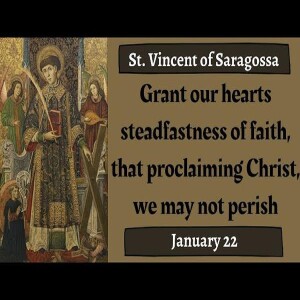
Monday Jan 22, 2024
Monday Jan 22, 2024
Stand In The Gap With Us And Saint Vincent of Zaragossa 1/22/2024
St. Vincent, the protomartyr of Spain, was a deacon of the 3rd century. Together with his Bishop, Valerius of Saragossa, he was apprehended during a persecution of Dacian the governor of Spain. He was born at Huesca, near Saragossa, Spain sometime during the latter part of the 3rd century; it is believed his father was Eutricius (Euthicius), and his mother was Enola, a native of Osca.
Vincent served as deacon under Bishop Valerius of Saragossa and was martyred under Emperor Diocletian. According to tradition, as punishment for refusing to perform pagan sacrifice, Vincent was imprisoned without food, placed on the rack, and finally roasted on a gridiron. He is the patron saint of Lisbon
Vincent was noble of lineage, but he was more noble by faith and religion, and was deacon to St. Valerian bishop. ... And by the commandment of Dacian the provost, Vincent and Valerian were drawn to Valence and there cast in prison. ... Then Dacian, being wroth, commanded that the bishop should be put in exile, and Vincent as a man presumptuous and despitous should be put to be tormented in the place named Eculeus. ... Vincent said to him, "O unhappy man, how weenest thou to anger me? The more grievously that thou torment me, so much more pity shall God have on me."
Most of what we know about this saint comes from the poet Prudentius. His Acts have been rather freely colored by the imagination of their compiler. But Saint Augustine, in one of his sermons on Saint Vincent, speaks of having the Acts of his martyrdom before him. We are at least sure of his name, his being a deacon, the place of his death and burial.
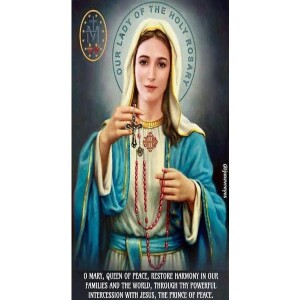
Monday Jan 22, 2024
Monday Jan 22, 2024
Join John Carpenter, Don Hartley, and the Deeper Truth research team as they examine another apparition of our Blessed Heavenly Mother.
A 30 year old young man named Auguste Arnaud went to Sunday mass on June 8, 1873 but then later he went to work in his vineyard. He was taking a break when Mary appeared to him and said: “I am the Blessed Virgin Mary, do not be afraid.
An apparition of the Blessed Virgin Mary to Auguste Arnaud on 8 June 1873 and 8 July 1873. Arnaud was married, the father of two,and a winemaker who regularly skipped Sunday Mass to work his vineyards.
Our Lady appeared to him in the vineyard on 8 June and reminded him:
“You must not work on Sundays.”
In honour of this blessing, Arnaud placed a Cross and a Statue of Mary at the site in the field. Later a little Chapel in honour of the Virgin was built there too.
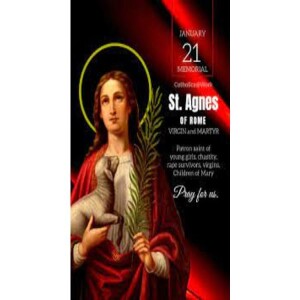
Sunday Jan 21, 2024
Sunday Jan 21, 2024
Stand In The Gap With Us And Saint Agnes 1/21/2024
St. Agnes of Rome was born in 291 AD and raised in a Christian family. Agnes was very beautiful and belonged to a wealthy family. Her hand in marriage was highly sought after, and she had many high ranking men chasing after her. However, Agnes made a promise to God never to stain her purity. Her love for the Lord was great and she hated sin even more than death!
Whenever a man wished to marry Agnes, she would always say, "Jesus Christ is my only Spouse."
According to legend, the young men she turned away became so angry and insulted by her devotion to God and purity that they began to submit her name to authorities as a Christian follower.
In one incident, Procop, the Governor's son, became very angry when she refused him. He tried to win her for his wife with rich gifts and promises, but the beautiful young girl kept saying, "I am already promised to the Lord of the Universe. He is more splendid than the sun and the stars, and He has said He will never leave me!"
In great anger, Procop accused her of being a Christian and brought her to his father, the Governor. The Governor promised Agnes wonderful gifts if she would only deny God, but Agnes refused. He tried to change her mind by putting her in chains, but her lovely face shone with joy.
Next he sent her to a place of sin, but an Angel protected her. At last, she was condemned to death. Even the pagans cried to see such a young and beautiful girl going to death. Yet, Agnes was as happy as a bride on her wedding day. She did not pay attention to those who begged her to save herself. "I would offend my Spouse," she said, "if I were to try to please you. He chose me first and He shall have me!" Then she prayed and bowed her head for the death-stroke of the sword.
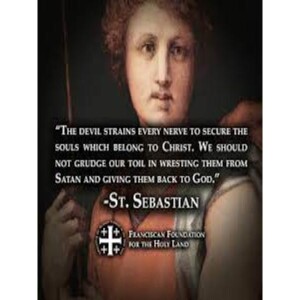
Saturday Jan 20, 2024
Saturday Jan 20, 2024
Stand In The Gap With Us And Saint Sebastian Patron of Athletes 1/20/2024
St Sabastian became very important to me growing up as I was very active in sports from a young age and learning that St. Sabastion is the patron of Athletes, his story aided in my Catholic faith as I placed the importance of being steadfast in the faith.
St. Sebastian grew up as a Christian in Milan. In order to assist the confessors and martyrs in their sufferings, he went to Rome about the year 98 and enlisted in the army. He became an officer and a favorite of the Emperor Diocletian. Marcus and Marcellinus, twin brothers, had been imprisoned for the Faith. Sebastian seeing this, exhorted them to remain loyal to Christ.
Sebastian entered the Roman army because there he could assist the martyrs without arousing suspicion.
He is also mentioned in a sermon on Psalm 118 by 4th-century bishop Ambrose of Milan (Saint Ambrose): in his sermon, Ambrose stated that Sebastian came from Milan and that he was already venerated there at that time.
St. Sabastion had roots coming from southern France and he was educated in Milan. He joined the Roman Army in 283 AD, ostensibly to be of service to other Christians who were being persecuted by the Romans. St. Sebastian distinguished himself and for his excellent service, he was promoted to serve in the Praetorian Guard to protect Emperor Diocletian.

Wednesday Jan 17, 2024
Wednesday Jan 17, 2024
The Divine Mercy made personal, Jesus I Trust in You
Jesus told St.Faustina," "These souls cause Me more suffering than any others; it was from such souls that My soul felt the most revulsion in the Garden of Olives. It was on their account that I said: 'My Father, if it is possible, let this cup pass Me by.' The last hope of salvation for them is to flee to My Mercy."
St. Faustina wrote in her diary: "On each day of the novena you will bring to My heart a different group of souls and you will immerse them in this ocean of My mercy ... On each day you will beg My Father, on the strength of My passion, for the graces for these souls."
Opening Prayers (optional):You expired, Jesus,but the source of life gushed forth for souls, and the ocean of mercy opened up for the whole world. O Fount of Life, unfathomable Divine Mercy, envelop the whole world and empty Yourself out upon us. O Blood and Water, which gushed forth from the Heart of Jesus as a fountain of mercy for us, I trust in You!
The Chaplet begins with the Our Father, the Hail Mary, and The Apostles Creed.
On the large beads, we pray: Eternal Father, I offer You the Body and Blood, Soul and Divinity of Your dearly beloved Son, Our Lord Jesus Christ, in atonement for our sins and those of the whole world.
On the ten small beads of each decade we pray: For the sake of His sorrowful Passion, have mercy on us and on the whole world.
The Chaplet is concluded with (three times): Holy God, Holy Mighty One, Holy Immortal One, have mercy on us and on the whole world.
The closing prayer (optional): Eternal God, in whom mercy is endless and the treasury of compassion inexhaustible, look kindly upon us and increase Your mercy in us, that in difficult moments we might not despair nor become despondent, but with great confidence submit ourselves to Your holy will, which is Love and Mercy itself.
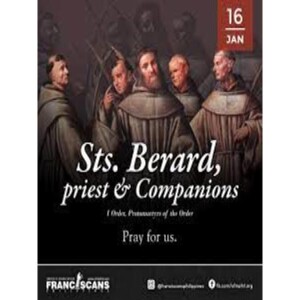
Tuesday Jan 16, 2024
Tuesday Jan 16, 2024
Stand In The Gap With Us And Saint Berard and Companions 1/16/2024
When our holy Father St Francis learned by divine revelation that God had called him and the members of his order not only to personal perfection but also for the salvation of the souls of others, he entertained an ardent desire to convert the Mohammedans, whose inroads at that time frequently endangered Christian countries and the Christian Faith.
He was well versed in Arabic, an eloquent preacher, and was chosen by St. Francis, together with two other priests, Peter and Otho, and two lay-brothers, Accursius and Adjutus, to evangelize the infidels of the East.
Saint Berard a thirteenth-century Franciscan friar who was executed in Morocco for attempting to promote Christianity. He and his companions, Peter, Otho, Accursius, and Adjutus, are venerated as saints and considered the Franciscan Protomartyrs.
At Seville, in southern Spain, which the Mohammedans occupied at the time, St Berard and Companions preached fearlessly in the mosque that the teaching of Mohammed was falsehood and deceit, and that salvation could be found only in the Faith of Christ.
In 1219, with the blessing of Saint Francis, Berard left Italy with Peter, Adjute, Accurs, Odo and Vitalis to preach in Morocco. En route in Spain, Vitalis became sick and commanded the other friars to continue their mission without him.
They started preaching immediately, on streets and in public squares. People treated them as if they were crazy and had them arrested. To save themselves from being sent back home, the friars declared they wanted to see the sultan. So the governor of Seville sent them to Morocco.
They tried preaching in Seville, then in Muslim hands, but made no converts. They went on to Morocco where they preached in the marketplace. The friars were immediately apprehended and ordered to leave the country; they refused.
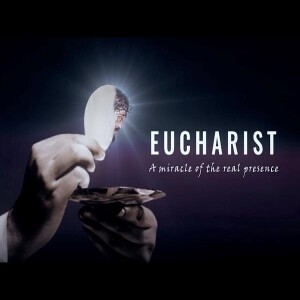
Tuesday Jan 16, 2024
Tuesday Jan 16, 2024
Eucharistic Miracles Sacred Hosts Decend miraculously Book of psalms 145 (144)
I want to exalt you, my God and my King,
and bless your name for ever.
The Lord is good to all,
and his mercy extends to all creatures.
Thank you Lord for all creatures
And bless you, your believers.
Proclaim the glory of Your Kingdom
and declare your glorious deeds.
that you may show your power to the men
the glory and splendor of Your Kingdom.
Your kingdom is an eternal kingdom,
your dominion extends to all generations.
On November 24, 1994 in Naju, during the visit by Archbishop Giovanni Bulaitis, the Apostolic Nuncio to Korea at that time, a large Sacred Host, already broken into two parts, came down to Julia Kim’s hands (between her fingers). Shortly after Archbishop Bulaitis and Father Raymond Spies, Julia’s spiritual director, divided the Sacred Host and gave Communion to about 70 people in the Chapel, a small Sacred Host came down and landed on Julia’s tongue while Archbishop Bulaitis and Father Spies were holding Julia’s hands and praying with her.
The small Sacred Host and a portion of the large Sacred Host have been preserved in a small monstrance. In her message to Julia just before the large Sacred host came down, the Blessed Mother said that the Lord was having St. Michael the Archangel bring to Naju the (large) Eucharist from a priest in sin.

Monday Jan 15, 2024
Monday Jan 15, 2024
Stand In The Gap With Us And Saint Devasahayam Pillai 1/15/2024
Devasahayam Pillai, who was born a Hindu but embraced Christianity in the 18th century, was canonised by Pope Francis during a Mass in St.Peter's Basilica on Sunday, making Blessed Devasahayam the first Indian layman to be declared a saint by the Vatican.
Neelakandan Pillai was born into an affluent Hindu family in 1712. As a young man he went into the service of the royal household in India’s Travancore province.
Born Neelakanda Pillai in the year 1712 at Nattalam in Kanyakumari district, he converted to Christianity in the year 1745. Seven years later, he was paraded on a buffalo and was shot dead at Aralvaimozhi on Jan. 14, 1752. He was tortured for three years ahead of his execution on charges of treason.
Eventually put in charge of state affairs, Pillai became acquainted with Captain Eustachius De Lannoy, the Dutch naval commander who trained the king of Travancore’s forces.
Their relationship awakened Pillai’s interest in the captain’s Christian faith. At his baptism in 1745, Pillai chose the name Lazarus, or Devasahayam in the Malayalam language. His wife and other members of his family were baptized at the same time.
Soon after, Pillai’s enemies convinced the royal court that he was using his position to force others to convert, leading to his imprisonment.
European Christians in Travancore came to Pillai’s defense, urging the king to release him. After three years the king complied under condition that Pillai go into exile to a hostile territory.
Though beaten and tortured almost daily, Pillai consistently responded with kindness, openly praying for his captors.

Monday Jan 15, 2024
Monday Jan 15, 2024
Join John Carpenter, Don Hartley, and the Deeper Truth research team as they examine this amazing appearance by Mary in Pontmain France.
Tradition holds that during the Franco-Prussian War, Mary appeared to six children on January 17, 1871, in the village of Pontmain, France. She told them to pray for protection as troops approached the village and assured them that the conflict would soon come to an end. After the children and villagers prayed with their priest at the site of her appearance, the Prussian troops left the village, and one week later, the war ended. All of the Pontmain citizens who fought in the war returned safely home.
The Chapel of Our Lady of od Hope at the Basilica is a gift of the late Bob and Dolores Hope, in memory of Avis Townes Hope, the mother of the famed entertainer. Bronze sculptures of Mary and two angels are surrounded by white Carrara marble and Fior de Pesco marble. Carved into the façade of the altar are the words of Our Lady of Hope, “Pray my children.” The chapel features the following prayer: Detail of Our Lady of Hope

Sunday Jan 14, 2024
Sunday Jan 14, 2024
Stand In The Gap With Us And Saint Gregory Nazianzen 1/14/2024
In 358, Gregory returned to Cappadocia. Gregory's father baptized him when he was thirty-three. His father, as bishop of Nazianzus, had Arian tendencies and even signed a statement of faith that was, at best, ambiguous in meaning concerning the Trinity.
After his baptism at 30, Gregory gladly accepted his friend Basil’s invitation to join him in a newly founded monastery. The solitude was broken when Gregory’s father, a bishop, needed help in his diocese and estate. It seems that Gregory was ordained a priest practically by force, and only reluctantly accepted the responsibility. He skillfully avoided a schism that threatened when his own father made compromises with Arianism. At 41, Gregory was chosen suffragan bishop of Caesarea and at once came into conflict with Valens, the emperor, who supported the Arians.
He is widely considered the most accomplished rhetorical stylist of the patristic age. As a classically trained orator and philosopher, he infused Hellenism into the early church, establishing the paradigm of Byzantine theologians and church officials.
Gregory is known best for his contributions to the liturgy. He reformed the Mass and the daily prayer of the Church and wrote prayers we still use today as well as commentaries on Scripture that shaped theology through the Middle Ages.
Though life is a mysterious trial, Gregory emphasized the need to act, age quod agis (“do what you can”). He stressed how this world and the next are joined in various forms of mediation, be they humanity's offerings to God or God's visitations of grace or wrath. For Gregory the mediation of the sacraments was central.
